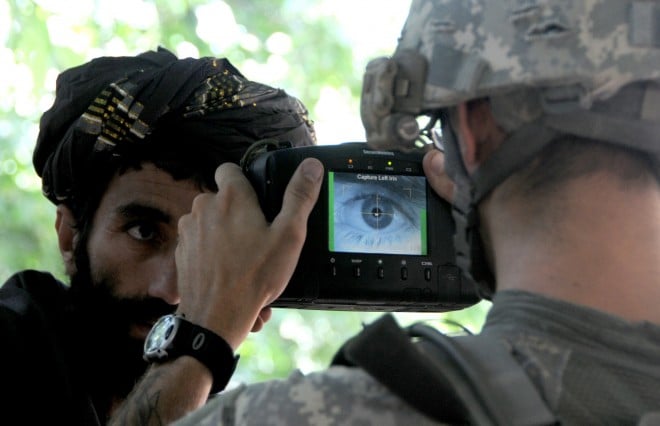In what could set alarm bells ringing, the Taliban now have access to a huge amount of personal biometric data of local Afghan citizens, the US Army, and its allies. Analysts fear potential misuse of sensitive data if they fall into the wrong hands
- Chinese J-20, Russian Su-57 Racing To Develop World’s 1st Stealth Fighter Jet With ‘Super Capabilities’
- Dream Come True For Aviation Enthusiasts As Microsoft Develops Platform To ‘Fly’ World’s Most Powerful Fighter Jet – F-35B
As the US military pulled out of Afghanistan marking an end to two decades of “war on terror”, they left behind an expansive biometrics program that was started with gusto during their prolonged stay.
The US began this program way back in 2002 by collecting iris scans, facial images, and fingerprints of the Afghan security forces. Ironically, the initial aim of the US military was to use this information to defend Afghan soil against the Taliban and other terrorist organizations.
Eventually, the US Department of Defense had established a separate Automated Biometric Identification System (ABIS) for the purpose of the curation of such data in 2004.
According to a Joint Special Operations Command official and three former US military personnel, these devices, known as HIIDE (Handheld Interagency Identity Detection Equipment) had been seized by the Taliban sometime last week.

These devices contain essential biometric data such as fingerprints, iris scans, and genetic information of a large population, possibly in millions.
This biometrics initiative has been taken seriously by the Afghan military over the past years. They were in the initial stages of getting students and staff at 5,000 Afghan madrassas registered for biometric purposes earlier this year too.
“Just think, they now have everything from the police, defense ministry, and election commission,” an official told New Scientist. “It was left behind in the rush to exit. They have everything.”
While building a strong system of information to tackle terrorists and insurgents, the possibility of such data privacy falling into the wrong hands never occurred to the US military intelligence or its allies.
“Moving forward, the US military and diplomatic apparatus should think carefully about whether to deploy these systems again in situations as tenuous as Afghanistan”, said Welton Cheng, chief technology officer for Human Rights First and a former Army intelligence officer.
Afghans Fear For Their Lives
With the Taliban in control of the biometric apparatuses now, its usage of personal information is now a question of impending concern.
This equipment and data ease the Taliban’s route to accessing those individual Afghan citizens that assisted diplomatic efforts during the coalition-backed regime, which translates into a direct threat to their lives.
Fearing Taliban persecution, common Afghans are scrubbing their digital profiles. Boys and men were “frantically going through phones to delete messages they have sent, music they’ve listened to & pictures they’ve taken,” BBC reporter Sana Safi tweeted.
Sean McDonald, who has worked in humanitarian data governance in the past, said, “The Taliban have a demonstrated interest in hunting, killing and scaring those who have worked with the government and global community.”
Afghan nationals that aided the US military in the past few years, most often as translators, have been accused of being “American Spies” or “Kaafir” (infidels). Recently, one such translator named Sohail Pardis, who had worked for the US Army, was beheaded at a check-post on the Kandahar Kabul highway, after receiving numerous death threats.
Faran Jeffery, deputy director at ITCT (Islamic Theology of Counter-Terrorism) told India Today, “I think Afghan interpreters and others who worked for American troops have largely been ignored by the US. And, I think most part of that blame goes to the US generals who were managing the withdrawal process.”
The question of the Taliban employing this biometric data to seek revenge on US Army allies is one with serious ramifications, mostly because the Taliban are not a homogenous political entity.
They are highly unstable and do not consider themselves to be answerable to the global community. There is no uniformity in their decision-making processes, as a former interpreter puts it correctly, “We just don’t know what they have on us”.
The Afgan biometric data case also raises some important queries about the potential of evolving biometric technologies, their security, and preparedness for it.
It is interesting that amidst the surveillance, curation and collection of data, the possibility of the equipment falling into the wrong hands was never considered.
Penned By Anshruta Banerjee
More @ EurAsian Times
- US Experiments With ‘Revolutionary Air Combat Training’ For Fighter Pilots To Dogfight Russian, Chinese Jets
- Despite J-20 Stealth Jet, Why Is China Keen To Acquire Another Stealth Fighter – Russian Su-57 To Its Arsenal?